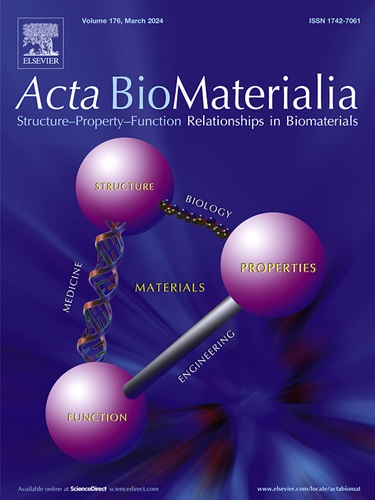Multifunctional nanodrug for simultaneously combating chemoresistance and immunosuppression in Fusobacterium nucleatum-associated colorectal cancer
IF 9.4
1区 医学
Q1 ENGINEERING, BIOMEDICAL
引用次数: 0
Abstract
Fusobacterium nucleatum (Fn) infection in colorectal cancer (CRC) induces chemoresistance and creates an immunosuppressive tumor microenvironment, compromising the efficacy of conventional chemotherapy. To address these challenges, a multifunctional MPLO@HA nanodrug was developed by conjugating metformin (Met), oxaliplatin (OxPt), and lauric acid (LA) onto oligomethyleneimine, subsequently complexed with hyaluronic acid (HA). The MPLO@HA nanodrug is designed to target Fn-infected CRC, offering multiple mechanisms for enhanced therapeutic outcomes. The nanodrug features a multi-stimuli responsive structure that enables precise and controlled release at the tumor site, responsive to pH, glutathione, and hyaluronidase levels. The enhanced positive charge of self-assembled nanodrug combined with Met effectively eradicates both extracellular and intracellular Fn, overcoming Fn-induced chemoresistance. Furthermore, incorporating Met improves the efficacy of chemotherapy by sensitizing CRC cells to treatment. The immunomodulatory properties of the MPLO@HA nanodrug promote immunogenic cell death, repolarize macrophages from the M2 to the M1 phenotype, and reduce the levels of regulatory T cells and myeloid-derived suppressor cells. By integrating antimicrobial, chemotherapeutic, and immunomodulatory capabilities, the MPLO@HA nanodrug offers a promising and comprehensive approach to combating Fn-induced chemoresistance and immunosuppression in CRC. This strategy could also provide a foundation for developing treatments for other cancers associated with bacterial infections.
Statement of significance
Fusobacterium nucleatum (Fn) infection in colorectal cancer (CRC) induces chemoresistance and creates an immunosuppressive tumor microenvironment, severely compromising treatment efficacy. Current therapies face challenges in addressing these issues due to the complex interactions between bacterial infection and tumor development. Our study introduces a multifunctional nanodrug, MPLO@HA, which integrates metformin, oxaliplatin, lauric acid, and hyaluronic acid into a multi-responsive nanodrug system. This nanodrug simultaneously combats bacterial infection, chemoresistance, and immunosuppression in Fn-associated CRC. MPLO@HA demonstrates synergistic effects by eradicating both extracellular and intracellular Fn, enhancing chemosensitivity, and modulating the tumor immune microenvironment. This comprehensive approach offers a promising strategy to overcome Fn-induced treatment barriers, potentially improving outcomes for patients with Fn-infected CRC and opening new avenues in bacteria-associated cancer therapy.

求助全文
约1分钟内获得全文
求助全文
来源期刊

Acta Biomaterialia
工程技术-材料科学:生物材料
CiteScore
16.80
自引率
3.10%
发文量
776
审稿时长
30 days
期刊介绍:
Acta Biomaterialia is a monthly peer-reviewed scientific journal published by Elsevier. The journal was established in January 2005. The editor-in-chief is W.R. Wagner (University of Pittsburgh). The journal covers research in biomaterials science, including the interrelationship of biomaterial structure and function from macroscale to nanoscale. Topical coverage includes biomedical and biocompatible materials.
 求助内容:
求助内容: 应助结果提醒方式:
应助结果提醒方式:


